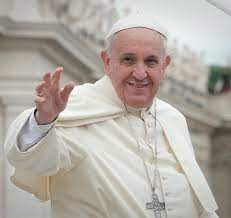Like the rest of the world’s billion-strong Catholic population, Chris Dugdale woke up Monday morning to the unexpected news of Pope Francis’s death.
Dugdale, superintendent of Catholic Independent Schools for the Diocese of Prince George, watched television coverage of the Pope’s final Easter Sunday address from the balcony of St. Peter’s Basilica in Rome, where he blessed the crowd and called for an end to global violence while preaching compassion for the planet’s marginalized.
Although he had been battling a life-threatening respiratory illness since mid-February, Francis had appeared to be on the road to recovery.
“It was a shock, especially after spending so much time at Mass the last few days, and we pray for him at every Mass,” said Dugdale. “He’s a household name —not just in my house but in all our classrooms, in all our Catholic schools.”
Dugdale said Francis made a concerted effort to connect with children, which raised his profile and popularity, especially among young people. But he also maintained a strong sense of humility, rejecting the lavish surroundings and lifestyle traditionally associated with the papacy.
“In a lot of his work, and especially in his book The Joy of the Gospel, he talked about a renewed personal encounter with faith — making our religion more of a personal connection — and that’s really relatable, especially for kids,” Dugdale said.
“We do a number of retreats in our schools for students, and they’re called to a personal prayer life with Christ. It’s something quite real and relatable. A lot of the resources we use now include quotes from Pope Francis or cite his work, so kids are quite well-versed in Francis-type teachings.
“It speaks volumes that he could bring the gospel in a relatable way to people of all ages — not just to kids, but also to my staff and our pastors. His work has been cited at all our conferences and professional learning sessions.”
Dugdale said Francis’s emphasis on kindness and direct engagement with the marginalized — such as his washing of prisoners’ feet on Holy Thursday — inspired hope among those seeking strength through the church during times of struggle. He was also the only pope to acknowledge the need for reconciliation over the Catholic Church’s role in Canada’s residential school system.
“That humility is so refreshing,” said Dugdale. “We often ask the kids, ‘What would Jesus do?’ and Pope Francis is an example of that. He was as humble as you can be.”
In the months ahead, Dugdale said students and staff in the region’s eight Catholic schools will be closely watching the process of selecting a successor to Francis, a native of Argentina who was the first non-European pope in 1,300 years. Flags at BC’s 77 Catholic schools will be lowered to half-mast in his honour.
“This is a very teachable moment for all our kids, and that’s what I want happening in all our classrooms for the next little while,” said Dugdale. “There’s quite a process in place, and we’ll be watching it carefully. The kids, the staff and the pastors will be talking about it daily for quite some time, I’m sure.”
The residential school system, which operated for more than a century with support from the federal government, forced an estimated 150,000 Indigenous children to attend boarding schools, where many were subjected to physical, mental and sexual abuse.
Pope Francis was lauded for his public apology during a 2022 tour of Canada, acknowledging the abuses committed by Catholic educators who sought to erase Indigenous culture and force assimilation into white society. Demands for an apology had intensified after the discovery of unmarked graves at former residential school sites.
The Truth and Reconciliation Commission of Canada, as one of its Calls to Action, asked the Pope to deliver an apology on Canadian soil. He did so in July 2022 at a gathering in Maskwacis, Alta., a community south of Edmonton and home to four First Nations, attended by then-prime minister Justin Trudeau.
“I’m sorry,” Francis said at the time. “I humbly beg forgiveness for the evil committed by so many Christians against the Indigenous peoples.”
This was mentioned in a written statement from the archbishop-elect of Vancouver.
“Pope Francis wore his heart on his sleeve, even to the public, even before mass audiences. But to see him open his heart, open his mind to the Indigenous was really — I think — an example to us all," wrote Rev. Richard Smith.



